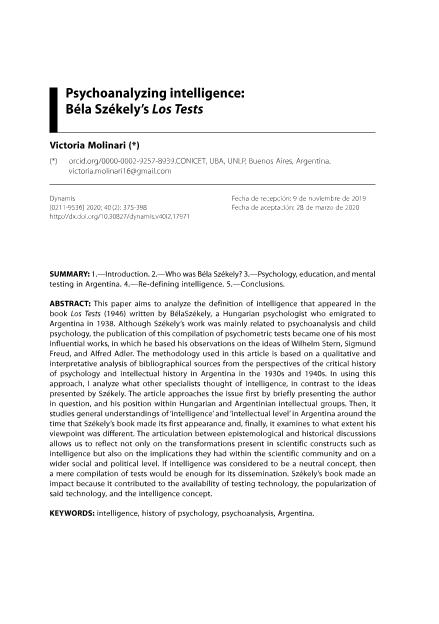Mostrar el registro sencillo del ítem
dc.contributor.author
Molinari, Victoria

dc.date.available
2022-09-15T15:10:11Z
dc.date.issued
2020-12
dc.identifier.citation
Molinari, Victoria; Psychoanalyzing intelligence: Béla Székely’s Los Tests; Universidad de Granada; Dynamis; 40; 2; 12-2020; 375-398
dc.identifier.issn
0211-9536
dc.identifier.uri
http://hdl.handle.net/11336/168948
dc.description.abstract
This paper aims to analyze the definition of intelligence that appeared in the book Los Tests (1946) written by Béla Székely, a Hungarian psychologist who emigrated to Argentina in 1938. Although Székely’s work was mainly related to psychoanalysis and child psychology, the publication of this compilation of psychometric tests became one of his most influential works, in which he based his observations on the ideas of Wilhelm Stern, Sigmund Freud, and Alfred Adler. The methodology used in this article is based on a qualitative and interpretative analysis of bibliographical sources from the perspectives of the critical history of psychology and intellectual history in Argentina in the 1930s and 1940s. In using this approach, I analyze what other specialists thought of intelligence, in contrast to the ideas presented by Székely. The article approaches the issue first by briefly presenting the author in question, and his position within Hungarian and Argentinian intellectual groups. Then, it studies general understandings of ‘intelligence’ and ‘intellectual level’ in Argentina around the time that Székely’s book made its first appearance and, finally, it examines to what extent his viewpoint was different. The articulation between epistemological and historical discussions allows us to reflect not only on the transformations present in scientific constructs such as intelligence but also on the implications they had within the scientific community and on a wider social and political level. If intelligence was considered to be a neutral concept, then a mere compilation of tests would be enough for its dissemination. Székely’s book made an impact because it contributed to the availability of testing technology, the popularization of said technology, and the intelligence concept.
dc.format
application/pdf
dc.language.iso
eng
dc.publisher
Universidad de Granada

dc.rights
info:eu-repo/semantics/openAccess
dc.rights.uri
https://creativecommons.org/licenses/by-nc-sa/2.5/ar/
dc.subject
ARGENTINA
dc.subject
HISTORY OF PSYCHOLOGY
dc.subject
INTELLIGENCE
dc.subject
PSYCHOANALYSIS
dc.subject.classification
Otras Psicología

dc.subject.classification
Psicología

dc.subject.classification
CIENCIAS SOCIALES

dc.title
Psychoanalyzing intelligence: Béla Székely’s Los Tests
dc.type
info:eu-repo/semantics/article
dc.type
info:ar-repo/semantics/artículo
dc.type
info:eu-repo/semantics/publishedVersion
dc.date.updated
2022-09-15T02:15:24Z
dc.journal.volume
40
dc.journal.number
2
dc.journal.pagination
375-398
dc.journal.pais
España

dc.journal.ciudad
Granada
dc.description.fil
Fil: Molinari, Victoria. Consejo Nacional de Investigaciones Científicas y Técnicas; Argentina. Universidad Nacional de La Plata. Facultad de Psicología. Instituto de Investigaciones en Psicología; Argentina. Universidad de Buenos Aires. Facultad de Filosofía y Letras. Instituto de Ciencias de la Educación; Argentina. Universidad de Buenos Aires. Facultad de Psicología. Instituto de Investigaciones; Argentina
dc.journal.title
Dynamis

dc.relation.alternativeid
info:eu-repo/semantics/altIdentifier/url/https://revistaseug.ugr.es/index.php/dynamis/article/view/17971
dc.relation.alternativeid
info:eu-repo/semantics/altIdentifier/doi/https://doi.org/10.30827/dynamis.v40i2.17971
Archivos asociados
